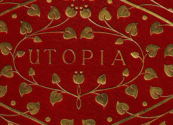What remains of politics in utopia?
by Brad Young
In contrast to a certain popular conception that characterizes utopia as the fantasy of an harmonious space, where all evil and discord have disappeared, I would like to explore how many utopian constructions in fact make conflict a central concern.
Whether considering the Empress of the Blazing World’s outright forbidding of all dissent, or the generally agreeable disagreements among the Utopians, or the eternal question of whether to exterminate the Yahoos in the otherwise harmonious land of the Houyhnhnms, the utopian tradition is replete with moments where contest itself becomes contested. A central question seems to be, how are we to deal with conflict in an ideal society? Elimination? Institutionalization? Relegation to private life? And alongside this, what value ought to be placed on discord and dissent? Are they an essential part of freedom? Or rather too dangerous to security and order? Furthermore, as we’ve discussed in class, is it not precisely a function of utopian texts to engender (or quell) debate about large scale social and political issues?
Any feedback on the topic would be great (in particular how to keep the focus sufficiently narrow…), but also, I’m still debating which texts I want to focus on. More seems the obvious choice. There’s so much to work with there: Book 1 is itself a debate, which contains within it other debates, e.g. the exchange between the fool as the friar, as Wootton notes, which may even be a later addition in response to the debates generated by Utopia‘s first draft (28-31 in the Hackett edition).
So I’m wondering, would it be useful to bring in Swift, since he presents a clear counterpoint? For the reasons that the worlds he juxtaposes have little to recommend them, he has a largely negative view of conflict, and seemingly little hope that debate will solve anything or produce positive outcomes. He even seems to take a dimmer view than Cavendish by suggesting that civilized Europeans’ reason only makes them cleverer in committing various atrocities (see, e.g., Gulliver’s pride in Europe’s weapons). However, while trying to not bite off more than I can chew, I’m also very interested in working with Ursula K. Le Guin’s The Dispossessed since this issue of discord and dissent within utopia is front and center there. Indeed, it drives her whole story since an unresolvable conflict between the protagonist, Shevek, and another jealous physicist is what precipitates his leaving the ambiguous, anarchist utopia of Annares. Additionally, many of the chapters focusing upon Shevek’s back story consist of fiery debates between him and his friends, not unlike the tabletalk in More’s Utopia. Also, as far as I can tell from my research so far, there hasn’t been much written specifically connecting these two texts on this subject, so it seems like it could be a useful new direction.
Though this may be enough, I figured I would throw out some other interesting and possibly useful points of connection between these three texts, including the division between reason and the passions (which figures importantly in so much Enlightenment thought) as well as the role played by friendship. After reading Wootton’s discussion of Erasmus again, I found myself wondering whether Utopia could be read as More’s attempt to present a society of friends. Or, to socialize friendship.



Exciting project! I really like it. I find myself wondering whether it is above all a LeGuin project (which would be ok with me) –and you could weave in earlier analogues/ contrasts. I could definitely see Swift having a role to play…your thoughts on More are terrific as well.
Maybe you and Sophia should work together for a while, if she goes ahead with the deferred violence theme? It seems like there are some good points of contact there.
I think it’s a matter of just making the choice of what texts to work with! It will be up to you to do that, but we can discuss this in class tomorrow….you have to close off potential exciting avenues and just make the judgment call. But don’t forget that you can write “companion articles” with similar concerns–as long as there is fresh research and writing in each one…
I think socializing friendship is probably right. I do know that it becomes a big deal in 17th century English political discourse. Laurie Shannon’s book comes to mind (I don’t know if she discusses More):
http://www.amazon.com/Sovereign-Amity-Friendship-Shakespearean-Contexts/dp/0226749665/ref=sr_1_1?s=books&ie=UTF8&qid=1414100109&sr=1-1&keywords=sovereign+amity